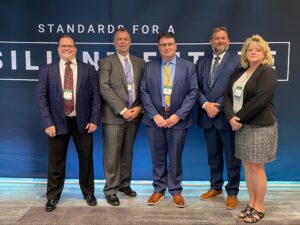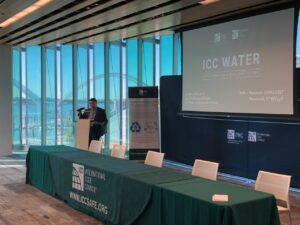
The International Code Council Hosts Industry Experts for Conference Celebrating 50th Anniversary of Clean Water Act
This conference opened necessary discussions on the three looming priorities in the water infrastructure space: decentralized wastewater, water efficiency and public health, and water reuse.
On Tuesday, October 18, 2022, the International Code Council (ICC) hosted a water policy and technical conference, ICC Water: Standards for a Resilient Future, in recognition of the 50th anniversary of the Clean Water Act. The single-day in-person conference brought together policymakers, contractors, engineers, code officials, academics, manufacturers, and health authority experts to discuss best practices for water codes and standards when planning for the future.
This conference opened necessary discussions on the three looming priorities in the water infrastructure space: decentralized wastewater, water efficiency and public health, and water reuse. Given an increasingly limited water supply, now is the time to create greater uniformity and consistency nationwide through the integration of public health, safety, and water quality requirements in our model codes and standards.
Addressing the Importance of Clean Water Solutions
Here are some key takeaways that attendees gathered from the conference:
- One in five homes in the U.S. relies on private decentralized wastewater systems. When private decentralized wastewater systems fail, the results are catastrophic—polluting drinking water and threatening public health. Changes in flood plains like rising sea levels brought on by climate change are exacerbating these system failures.
- Most states have developed their own codes for decentralized wastewater systems instead of adopting the Code Council’s International Private Sewage Disposal Code, furthering the need for improved collaboration on these efforts in the future.
- Future technologies can improve decentralized wastewater systems; federal funding sources such as an EPA program authorized by the Bipartisan Infrastructure Law (BIL) for which they are advocating full appropriations; and a new private sewage disposal system standard (ICC 825) being developed by the Code Council to tackle climate risks to septic systems in the U.S. and abroad and to incorporate advances in decentralized waste technology.
- Efforts like WaterSense focus on improving fixture efficiency without addressing the system of in-wall piping built for higher flow rates. Without addressing the entire system of plumbing, issues like stagnant water can negatively impact public health.
- Onsite water reuse is an important tool for combating water scarcity and protecting public health, but a lack of consistent regulatory approaches has hindered adoption.
- Adopting the Code Council’s codes and standards could enable onsite reuse.
Moving Towards Clean Water Solutions

The robust discussions and technical sessions during this event underscored the importance of acting now to improve water policies. The Code Council is developing two new ANSI plumbing standards. The private sewage disposal system standard (ICC 825) will tackle climate risks to septic and other types of decentralized wastewater systems in the U.S. and abroad while incorporating advances in technology. To increase water efficiency and address the entire plumbing system the Code Council is developing a new ICC 815 standard which will address pipe sizing for water distribution, drainage and venting systems by improving upon the outdated methods currently used in all plumbing codes, as well as account for post-COVID-10 usage patterns. Funding the NIST Plumbing Research Act is an important complement to this effort.
You can help develop these new ICC plumbing standards by applying to one or both standards committees. The application deadline is October 30, 2022.
Water Reuse Working Group

With a large swath of the U.S. facing historic droughts, advancing water reuse is critically important. While the water reuse conversation has focused almost exclusively on utility scale reuse, onsite reuse is an equally important tool towards combating water scarcity and protecting public health.
The Code Council, in partnership with the National Blue Ribbon Commission (NBRC), established a Water Reuse Working Group to support the advancement of best practices for reuse in building codes, improve the evolution of public opinion on reusing treated wastewater, and exploring how the U.S. can improve its ranking among world leaders in effective reuse of treated wastewater. This diverse working group will continue to research all aspects of onsite water reuse, develop a roadmap, and propose needed resources, including recommended updates to the International Codes (I-Codes) – that are necessary to meet jurisdictions’ water reuse goals.
To learn more about how the Code Council’s codes and standards enable reuse, click here.
To learn more or participate in ICC’s Water Reuse Working Group, click here.
For more information on how to join the Water Reuse Working Group, please contact:
- Rich Anderson, PMG Technical Resources
- Kevin McOsker, Vice President of Technical Services, Government Relations







